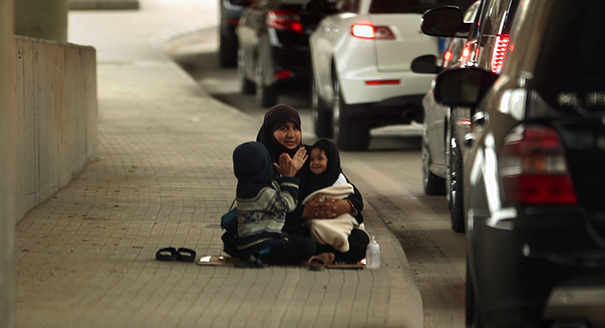Lebanon’s public debt reached an extremely high 150 percent of GDP in 2018, pushing the country to the verge of a major economic and financial crisis. To alleviate the problem, the government recently adopted austerity measures in its budget for 2019*. This is unfortunate given that the current economic situation is characterized by a greatly deteriorated state infrastructure, rampant poverty, and one of the highest levels of inequality in the world.
To tackle the debt crisis, the government has announced a wide range of budgetary measures. These include cuts in public-sector wages, salaries, and pensions; an increase in taxes on imported products and the exit tax from Beirut airport; additional fees on special license plates, tinted car windows, as well as permits to carry firearms; and funding cuts for nongovernmental organizations.
The new measures are marginal, incoherent, and will very probably be inefficient. Most importantly, the burden of the new measures will fall disproportionally on the most vulnerable economically and is likely to further worsen their standard of living. Reforms targeting the more affluent—such as the proposed fee on tinted car windows, often associated with those who are well connected—are more symbolic than geared to significantly decreasing the deficit. Indeed, the richest, who are primarily responsible for the country’s indebtedness, are not really being asked by the state to participate in reducing the debt.
What are the alternatives? Choosing policies to reduce the public debt isn’t straightforward and depends on each country’s institutions, history, and economic situation. Given the Lebanese economy’s characteristics—high poverty, inequality, and the absence of a state—there are more suitable alternatives to proposed austerity measures.
A new, simpler, more progressive tax on income and wealth could be a major step toward effective debt reduction. The current tax base is small and tax avoidance and evasion are easy. An initial measure could be to replace the current schedular system of personal income tax—which taxes each source of income separately—with a general tax on all sources of income, in particular all types of profits. This would simplify the system and make tax collection easier. Besides, the system currently in force is regressive, as taxing each source of an individual’s income separately brings in less revenue than applying the rate to total income earned.
This reform should be accompanied by an increase in the top marginal tax rates, which are extremely low by international standards. In this regard, the fiscal measures in the new budget, which include increases in the top marginal tax rates on wages and parts of business profits to 25 percent, are a step in the right direction, but still insufficient. Furthermore, an increase in Lebanon’s corporate tax, among the lowest in the world, would easily augment public revenue.
Turning to wealth, another effective way to pay for the public debt would be to implement an exceptional tax on private capital, in particular on real estate. For example, in rich countries such as the United States, France, or China, private capital represents on average 600 percent of national income. A flat tax of 15 percent on private capital would therefore yield almost a year’s worth of national income (90 percent, to be exact). In Lebanon, it is difficult to estimate the value of total private capital. However, looking at the Forbes data on billionaires’ wealth—the only source available for the country and many other countries—Lebanese billionaires seem to be doing fine. Their wealth represented on average 20 percent of national income between 2005 and 2016, as opposed to 2 percent in China, 5 percent in France, and 10 percent in the United States.
The fact that Lebanese billionaires’ wealth represents a higher share of total national income than in these three countries not only suggests that wealth is extremely concentrated in Lebanon, but also that the total amount of private capital as a share of national income is probably near or even higher than in France, the U.S., or China, where it is close to 600 percent of national income. In other words, we can assume that it represents between 400–700 percent of national income, which is not surprising given the dynamism of the banking and real estate sectors. If we do the same computations as before, imposing a flat tax on wealth in Lebanon could yield 60–110 percent of national income, that is between 30–60 percent of the total debt (the computations can be made using data available at the World Inequality Database).
Major fiscal reform has several key advantages. For the moment, the Lebanese tax system does a poor job of raising revenues. In recent years, tax revenue represented on average 15 percent of GDP, as opposed to 34 percent in countries from the Organization for Economic Cooperation and Development. Taxes on income and wealth represent less than 6 percent of total GDP. Thus, there is significant scope for raising taxes and revenue. This reform would make everyone contribute equally to the debt reduction effort and prevent any further increase in inequality and poverty, which could lead to a major social and political crisis. It should therefore be a key priority for the Lebanese government.
*The Lebanese budget mentioned in the story is for 2019, not 2020. Diwan has corrected the error.






